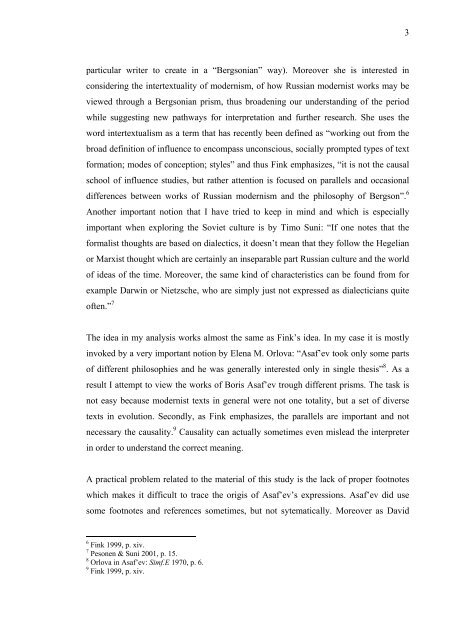Boris Asaf'ev and the Soviet Musicology - E-thesis
Boris Asaf'ev and the Soviet Musicology - E-thesis
Boris Asaf'ev and the Soviet Musicology - E-thesis
You also want an ePaper? Increase the reach of your titles
YUMPU automatically turns print PDFs into web optimized ePapers that Google loves.
particular writer to create in a “Bergsonian” way). Moreover she is interested in<br />
considering <strong>the</strong> intertextuality of modernism, of how Russian modernist works may be<br />
viewed through a Bergsonian prism, thus broadening our underst<strong>and</strong>ing of <strong>the</strong> period<br />
while suggesting new pathways for interpretation <strong>and</strong> fur<strong>the</strong>r research. She uses <strong>the</strong><br />
word intertextualism as a term that has recently been defined as “working out from <strong>the</strong><br />
broad definition of influence to encompass unconscious, socially prompted types of text<br />
formation; modes of conception; styles” <strong>and</strong> thus Fink emphasizes, “it is not <strong>the</strong> causal<br />
school of influence studies, but ra<strong>the</strong>r attention is focused on parallels <strong>and</strong> occasional<br />
differences between works of Russian modernism <strong>and</strong> <strong>the</strong> philosophy of Bergson”. 6<br />
Ano<strong>the</strong>r important notion that I have tried to keep in mind <strong>and</strong> which is especially<br />
important when exploring <strong>the</strong> <strong>Soviet</strong> culture is by Timo Suni: “If one notes that <strong>the</strong><br />
formalist thoughts are based on dialectics, it doesn’t mean that <strong>the</strong>y follow <strong>the</strong> Hegelian<br />
or Marxist thought which are certainly an inseparable part Russian culture <strong>and</strong> <strong>the</strong> world<br />
of ideas of <strong>the</strong> time. Moreover, <strong>the</strong> same kind of characteristics can be found from for<br />
example Darwin or Nietzsche, who are simply just not expressed as dialecticians quite<br />
often.” 7<br />
The idea in my analysis works almost <strong>the</strong> same as Fink’s idea. In my case it is mostly<br />
invoked by a very important notion by Elena M. Orlova: “Asaf’ev took only some parts<br />
of different philosophies <strong>and</strong> he was generally interested only in single <strong>the</strong>sis” 8 . As a<br />
result I attempt to view <strong>the</strong> works of <strong>Boris</strong> Asaf’ev trough different prisms. The task is<br />
not easy because modernist texts in general were not one totality, but a set of diverse<br />
texts in evolution. Secondly, as Fink emphasizes, <strong>the</strong> parallels are important <strong>and</strong> not<br />
necessary <strong>the</strong> causality. 9 Causality can actually sometimes even mislead <strong>the</strong> interpreter<br />
in order to underst<strong>and</strong> <strong>the</strong> correct meaning.<br />
A practical problem related to <strong>the</strong> material of this study is <strong>the</strong> lack of proper footnotes<br />
which makes it difficult to trace <strong>the</strong> origis of Asaf’ev’s expressions. Asaf’ev did use<br />
some footnotes <strong>and</strong> references sometimes, but not sytematically. Moreover as David<br />
6 Fink 1999, p. xiv.<br />
7 Pesonen & Suni 2001, p. 15.<br />
8 Orlova in Asaf’ev: Simf.E 1970, p. 6.<br />
9 Fink 1999, p. xiv.<br />
3

















